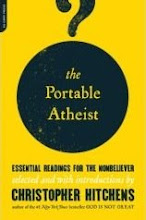I've been incredibly busy and hectic the last few weeks, which is why I have not posted anything new. Trust me though, I've been thinking about a lot of things. A few weeks ago I went to a wedding at a church that was remarkably cult-like, and solidified my conviction that I'm done with churches but for weddings/funerals, but more on that in another post. One thing I've been thinking about recently -- what is at the root of the problem with supernatural beliefs? What is the fundamental problem with belief systems that have a basis in the supernatural?
Personally, I think the biggest issue is that in supernatural belief systems the truth is relative. The truth can be whatever you believe it to be. In this way, I think some belief systems rob the truth of its inherent meaning. This idea, for me anyway, defines the inherent problem with believing in the supernatural.
There is no real evidence in favor of gods, angels, djinns, fairies, etc. so people are free to invent whatever evidence they feel like. Someone could study really really hard for the LSAT and do everything to put themselves in a position to do well--and then when they do actually do well they then say its obvious god was the one responsible for it. Whatever they want to believe--they can mold their life experiences around their pre-existing beliefs and call it 'evidence'.
For example, if you want to believe that someone named Noah built an ark and put every animal on the planet in pairs on the boat to save them from a catastrophic flood then its perfectly acceptable and even encouraged. This is all despite the fact that this supposedly happened in the middle east somewhere although there is not a single shred of credible evidence to support it. Strange, considering how the middle east is among the most heavily archaeologically excavated areas in the world--so you'd think we would have found some piece of evidence in favor of it.
This example is fairly benign, but you can see how this type of logic would cause problems. How do people separate what they want to believe from what is actually true. What about when parents believe that vaccines are dangerous and cause autism, despite the evidence to the contrary, and don't get their kids vaccinated and start a measles outbreak in their community? What about when policymakers block funding for stem cell research simply because they believe that zygotes have souls...despite the complete lack of evidence that souls even exist.
For example, if you want to believe that someone named Noah built an ark and put every animal on the planet in pairs on the boat to save them from a catastrophic flood then its perfectly acceptable and even encouraged. This is all despite the fact that this supposedly happened in the middle east somewhere although there is not a single shred of credible evidence to support it. Strange, considering how the middle east is among the most heavily archaeologically excavated areas in the world--so you'd think we would have found some piece of evidence in favor of it.
This example is fairly benign, but you can see how this type of logic would cause problems. How do people separate what they want to believe from what is actually true. What about when parents believe that vaccines are dangerous and cause autism, despite the evidence to the contrary, and don't get their kids vaccinated and start a measles outbreak in their community? What about when policymakers block funding for stem cell research simply because they believe that zygotes have souls...despite the complete lack of evidence that souls even exist.
I think truth should be objective. Although there are some things that will always be subjective (do I look good in red? am i attractive?), there are some things that are facts. The earth is billions of years old. Our species is one of many on this planet that evolved through gradual steps. I only wish it wasn't ok for people to believe whatever they want to believe just because they have been told so. At the very least, those beliefs should be kept out of the public sphere.
.jpg)



4 comments:
if you want to believe that someone named moses built an ark and put every animal on the planet in pairs on the boat to save them from a catastrophic flood
You mean Noah? ;)
(C'mon, man. We atheists have a reputation to uphold. Everyone knows we know scripture better than believers do.)
Okay, I'm kidding with you.
I was just thinking about this today. I think the real, central weakness in religion is that in order for it to "work," you have to believe it. If you stop believing it, it stops working. Think about it: God is supposed to be the most powerful being in the Universe, omniscient, omnipresent, and omnipotent. But if I don't believe in him, he's absolutely powerless to do anything for me. Consider the famous sports slogan, John 3:16. "That whosoever believeth in Him shall not perish..." In other words, Jesus (aka God) is supposed to be the embodiment of supernatural power. But if little old me should happen not to believeth in him, he's completely powerless to help me. Can't lift a finger. Jesus might want to save my immortal soul, but unless I believe in him, he can't do a damn thing. (I mean, think about it: It's Jesus H. Christ, and I can tell Him to take a hike, and He can't stop me. Who's got the real power in this relationship?)
But science and reason don't work like that. It's like Galileo said, "Eppur se muove." Whether you believe the Sun moves around the earth is immaterial, it moves anyway. I could be a card-carrying Young Earth Creationist, but if I follow the rules of evolutionary theory, I can discover Tiktaalik or create an antibiotic to treat MRSA, and it doesn't matter whether I believe it or not. Science works, regardless.
Make no mistake, when the idiots who got us into Iraq talk about "supporting the troops," they're not talking about tactical and material support, or competent strategic leadership, or even providing basic services for our veterans. They mean "believing real hard" that everything will work out. And so, this habit of thinking that "believing" things will make them happen has real disastrous consequences for real people.
(And don't even get me started on the economy, or the Katrina fiasco, or energy, or....)
You mean Noah? ;)
Perhaps he meant Utnapishtim. Or perhaps it was Atrahasis. Or Matsya. Or...
I have a friend not a Christian but sympathetic to Christianity. He stated that he does not care about evidence or thinking he will always go on what he feels. Pretty much a good summation of the religious mindset. I watched a video of a Dan Dennett talk. Rather than talk about arguments he outlined good reasons for declaring “belief” in God.
It boils down to four things
1.Fear. (fear of hell, or societal collapse, loss of meaning, purpose.)
2. Love. The need to feel it, they don’t want to hurt their family by questioning the faith. This of course leads to guilt where they don’t want to feel guilty for leaving the faith.
3. Being wrong. Says it all really.
4. Concorde fallacy. Ie I have invested 5 or 10 years of my life in this religion, I have a Christian wife and children being raised in the faith. I have to much invested to back out.
His talk perhaps made me consider that maybe at times when dealing with people it may be better to try a softly softly approach. Coax them out of their fears make them perhaps understand their beliefs and my views rather than go on the merry go round of argument and debate. Though of course this can be fun.
Best.
Michael.
"belief is the unquestionable acceptance of illogical assumptions"
Post a Comment